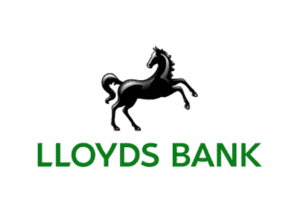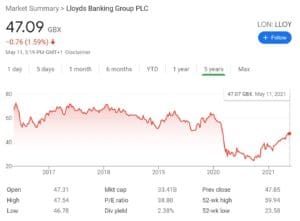How to Buy Lloyds Bank Shares Online in the UK
Lloyds is a hallmark UK financial institution that offers a variety of banking services. This includes traditional lending, credit cards, mortgages, and business finance.
Although its shares are worth just a fraction of what they were pre-2008, Lloyds could still represent a viable investment at current prices. This is especially the case in the midst of the COV-19 pandemic, not least because the banking firm has since seen its stocks tumble.
In this guide, we show you how to buy Lloyds shares online in the UK. On top of showing you how to make a purchase, we also discuss the best UK brokers to do this with.
-
-
Step 1: Find a UK Stock Broker to Buy Lloyds Shares
 Lloyds shares can be purchased from hundreds of different online stock brokers. As no-two platforms are the same, you need to do some homework before opening an account. For example, you need to look at factors like commissions and fees, supported payment methods, minimum investment amounts, and of course – regulation.
Lloyds shares can be purchased from hundreds of different online stock brokers. As no-two platforms are the same, you need to do some homework before opening an account. For example, you need to look at factors like commissions and fees, supported payment methods, minimum investment amounts, and of course – regulation.Below you will find a small selection of the best UK stock brokers allowing you to buy Lloyds shares from the comfort of your home.
1. IG – Trusted UK Share Dealing Platform With Competitive-Fees
 IG is an online broker that gives you access to over 10,000 shares. The platform is headquartered in the UK and first entered the brokerage arena in 1974. Since then, IG has attracted a client base of over 239,000 investors. In terms of buying Lloyds shares, you can achieve this goal at a commission of £8 per trade. This means that you will pay £8 when you buy Lloyds shares, and again when you sell them.
IG is an online broker that gives you access to over 10,000 shares. The platform is headquartered in the UK and first entered the brokerage arena in 1974. Since then, IG has attracted a client base of over 239,000 investors. In terms of buying Lloyds shares, you can achieve this goal at a commission of £8 per trade. This means that you will pay £8 when you buy Lloyds shares, and again when you sell them.If you think that you will be buying and selling shares on a regular basis, you can actually get your commission down to just £3. In order to do this, you will need to place at least three buy or sell orders in the previous month. On top of Lloyds shares, IG lists hundreds of other UK companies. You can also invest in dozens of international markets with ease. This is great for building a diversified portfolio through a single platform.
Additionally, IG also offers CFD and spread betting services. This gives you the opportunity to place more sophisticated trades on Lloyds shares. For example, both mediums allow you to short-sell Lloyds – meaning that you can profit if the shares go down. You can also apply leverage of up to 1:5 if you’re a retail client, and significantly more if you come from a professional trading background. The spread betting service specifically allows you to make profits without paying capital gains.
IG gives you a few options when it comes to selecting your preferred trading platform. For example, you can trade via the IG website or download MetaTrader 4. You can also buy and sell shares via the IG investment app – which is available on iOS and Android devices. If you like what IG has to offer, accounts can be opened online and require a minimum deposit of £250. You can do this with a debit card, credit card, or bank account transfer. IG is regulated by the FCA, alongside other licensing bodies.
Pros:
- FCA Regulated UK broker with a long-standing reputation
- Good value share dealing services
- Leverage and short-selling also available
- Spread betting and CFD products
- Access to UK and international markets
- Great research department
Cons:
- Minimum deposit of £250
- US stocks have a $15 minimum commission
Step 2: Research Lloyds Shares
So now that we have discussed the best UK stock brokers to buy Lloyds shares from, you now need to do a bit of research. This is crucial whether you’re investing in Lloyds or similar shares like HSBC shares, as you need to be sure that the assets represents a viable investment. In order to help clear the mist, below we list some background information on Lloyds and where the markets think its shares are likely to go in the near future.
Lloyds Share Price History
Lloyds Banking Group PLC – more commonly referred to as Lloyds – is a major UK bank that traces its roots back to 1695. The bank as we know it today is actually a merger of two UK financial institutions – Lloyds TSB and HBOS. In terms of its stock, Lloyds is listed on the London Stock Exchange.
It is also a constituent of the FTSE 100, and carries a market capitalization of £19 billion as of August 2020. When the aforementioned merger took place in 2014, the Lloyds share price was around the 75p mark. Since then, the shares have been moving in a southward direction.
For example, at the turn of 2020 Lloyds shares were priced at 63p. This means that over the course of six years, investors were looking at losses of 16%. With that said, the downfall of Lloyds was further amplified by the wider impact of COV-19. This wasn’t just the case with Lloyds, but the vast bulk of the UK banking scene.
Nevertheless, the shares hit 32p in March, translating into a share price of reduction of almost 50% in just under three months. However, the wider FTSE 100 index recovered by 16% by August while Lloyds shares continued to tumble. Lloyds shares have since begun climbing and are at nearly 48p per share as of May 2021. The shares remain 16% below their pre-pandemic price level.
Lloyds Shares Dividend Information
It seems to be going from bad to worst for Lloyds shareholders, not least because the firm suspended its dividend policy in April 2020. With that being said, the suspension was initiated by the Bank of England. This wasn’t only the case with Lloyds, but the rest of the UK banking sector.
The Bank of England got involved as a means to protect UK banking capital and thus – free up the need to distribute dividends. Crucially, there is no knowing how long it will be before Lloyds resumes its dividend policy, so capital gains will need to be the main focus in the short-to-medium term.
Should I Buy Lloyds Shares?
Although the above information is important, you as an investor should be more concerned with the future. In other words, just because it has been somewhat of a tough few years for Lloyds, that isn’t to say that the UK banking giant represents a bad investment.
After all, seasoned investors will base their decision on the current value of the shares, and how this relates to projected future cash flows.
Below we list some of the most important points that you need to consider before buying Lloyds shares.
Huge Upside Potential
While it has been doom and gloom for Lloyds and its ever-dropping share price this year, some would argue that now actually represents a shrewd time to enter the market. This is especially the case when you consider the price of Lloyds shares at the turn of 2020 and thus – before the pandemic was taken seriously by the markets.
The said price stood at 63p on January 1st. Today, the very same shares are priced at 48p. With that in mind, a return to January levels would translate into growth of 25%. While it remains to be seen if and when the bank can get back to the 63p-mark, there is plenty of upside potential at current pricing levels.
Mortgage Holidays and Bad Debts
On the flip side, the reality is that Lloyds could be facing some very difficult times in the coming quarters. First and foremost, the government lockdown resulted in homeowners having the option of applying for a mortgage holiday.
This was heavily received, and no doubt a major strain on much-needed cash flow for Lloyds. Similarly, it is all-but-certain that the bank will begin to see an upsurge in bad debt. In fact, management at Lloyds has already noted that it has increased its provision for such an instance.
Interest Rates at Record Lows
Although interest rates were low before the pandemic came to light, the Bank of England made the decision to reduce this even further to just 0.1%. Crucially, this is bad news for Lloyds and the wider UK banking sector. After all, interest rate cuts are typically passed on to borrowers due to increased competition.
You then have loans that specifically track the Bank of England base rate. This means that lending margins for Lloyds have once again been squeezed. In turn, this results in lower operating profits.
The Financials
In terms of the financials, Lloyds reported a 7% reduction in profits year-on-year in February 2020. To follow suit, net income was down 4%. For stockholders, earnings per share dropped by a huge 36%.
However, this was largely due to the firm’s substantial PPI settlement. Additionally, net interest dropped to just 2.88%. For those unaware, this is the difference between the average interest rate charged to borrowers, against what the bank pays to savers.
In terms of the positives, Lloyds was able to cut operating costs by 4%. However, the bank saw an increase in bad loans – with the figure rising by 38%.
Shareholders should expect this number to once again grow, as per the previously mentioned bad debt provision. With that being said, Lloyds was planning to pay a final dividend of 2.25p earlier in the year. This would have represented a 5% increase from the prior 12 months. However – and as we covered earlier, this was subsequently suspended by the Bank of England.
Lloyds Bank Shares Buy or Sell
Lloyds shares have been slow to recover in the wake of the COVID-19 pandemic thanks to ultra-low interest rates, a government-imposed mortgage holiday, and declining earnings. However, as the UK economy has begun to recover, Lloyds has shown some signs of growth. The shares have more than doubled in the past 6 months, and they still have a 25% upside to get back to their pre-pandemic levels.
Given that, we think that Lloyds shares are a buy today – with some caveats.
Investors need to be aware that the recovery is likely to be slow. The UK will likely keep interest rates depressed for at least the next year, which will limit Lloyds’ profit margins. At the same time, economic damage wrought by the pandemic could lead to significant losses on mortgages and other loan products.
If you’re willing to be patient, though, Lloyds shares are attractive. The bank was able to easily weather a massive economic shock, even if the stock price took a hit. In addition, Lloyds continues to pay out a dividend yield of 2.3% – a nice reward for investors who stick with the company.
The Verdict
If you’ve read our guide all of the way through, then you will know that Lloyds shareholders had a tough 2020. The shares are down by over 50% since the turn of the year and the firm has since been forced to suspend its planned dividend. With bad debts expected to increase and consumers making full-use of the government’s mortgage holiday safety-net, this has further amplified the issues being faced by the wider UK banking space.
However, it is important to remember that Lloyds shares were hovering above the 60p mark at the turn of the year. The wider impact of the coronavirus pandemic was beyond the bank’s control, which is why there might be some upside based on current prices.
FAQs
How much were Lloyds shares before the financial crisis?
Lloyds shares are worth just a fraction of pre-2008 levels. In fact, the shares were worth just under 400p in mid-2007. This means that the shares are now worth 93% less.
What stock exchange is Lloyds listed on?
Lloyds is listed on the London Stock Exchange.
Does Lloyds pay dividends?
When Lloyds released its annual earnings report in February 2020, it had planned to pay a final dividend of 2.25p. This was 5% higher than the prior year. However - and alongside the rest of the UK banking sector, Lloyds was forced to suspend its dividend payment. This was decided by the Bank of England to preserve cash flow levels.
When was Lloyds founded?
Lloyds traces its roots back to 1695. However, Lloyds Banking Group PLC as we know it today is a result of HBOB and Lloyds TSB merging in 2014.
Where can I buy Lloyds shares?
You can buy Lloyds shares from hundreds of online brokers. As long as the broker gives you access to the London Stock Exchange, you can make a purchase at the click of a button.
Kane Pepi
View all posts by Kane PepiKane Pepi is a British researcher and writer that specializes in finance, financial crime, and blockchain technology. Now based in Malta, Kane writes for a number of platforms in the online domain. In particular, Kane is skilled at explaining complex financial subjects in a user-friendly manner. Academically, Kane holds a Bachelor’s Degree in Finance, a Master’s Degree in Financial Crime, and he is currently engaged in a Doctorate Degree researching the money laundering threats of the blockchain economy. Kane is also behind peer-reviewed publications - which includes an in-depth study into the relationship between money laundering and UK bookmakers. You will also find Kane’s material at websites such as MoneyCheck, the Motley Fool, InsideBitcoins, Blockonomi, Learnbonds, and the Malta Association of Compliance Officers.
WARNING: The content on this site should not be considered investment advice and we are not authorised to provide investment advice. Nothing on this website is an endorsement or recommendation of a particular trading strategy or investment decision. The information on this website is general in nature, so you must consider the information in light of your objectives, financial situation and needs. Investing is speculative. When investing your capital is at risk. This site is not intended for use in jurisdictions in which the trading or investments described are prohibited and should only be used by such persons and in such ways as are legally permitted. Your investment may not qualify for investor protection in your country or state of residence, so please conduct your own due diligence or obtain advice where necessary. This website is free for you to use but we may receive a commission from the companies we feature on this site.
Buyshares.co.uk provides top quality insights through financial educational guides and video tutorials on how to buy shares and invest in stocks. We compare the top providers along with in-depth insights on their product offerings too. We do not advise or recommend any provider but are here to allow our reader to make informed decisions and proceed at their own responsibility. Contracts for Difference (“CFDs”) are leveraged products and carry a significant risk of loss to your capital. Please ensure you fully understand the risks and seek independent advice. By continuing to use this website you agree to our privacy policy.
Trading is risky and you might lose part, or all your capital invested. Information provided is for informational and educational purposes only and does not represent any type of financial advice and/or investment recommendation.
Crypto promotions on this site do not comply with the UK Financial Promotions Regime and is not intended for UK consumers.
BuyShares.co.uk © 2025 All Rights Reserved. UK Company No. 11705811.
We use cookies to ensure that we give you the best experience on our website. If you continue to use this site we will assume that you are happy with it.OkCookie PolicyScroll Up

 Although the above information is important, you as an investor should be more concerned with the future. In other words, just because it has been somewhat of a tough few years for Lloyds, that isn’t to say that the UK banking giant represents a bad investment.
Although the above information is important, you as an investor should be more concerned with the future. In other words, just because it has been somewhat of a tough few years for Lloyds, that isn’t to say that the UK banking giant represents a bad investment.